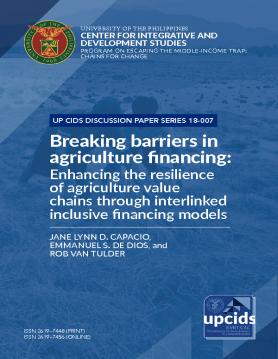You are here
Breaking barriers in agriculture financing: Enhancing the resilience of agriculture value chains through interlinked inclusive financing models
In the Philippines, smallholders need agriculture financing while banks are penalized for insufficiently lending to the agrarian and agriculture sectors. This finance gap proves difficult to fill for a number of reasons: (a) limited understanding of the conditions under which smallholders can become and stay competitive; (b) limited appreciation of the resilience of value chains; (c) difficulty in assessing and mitigating risks at all levels of value chains; and (d) non-aligned business model of financial institutions with the demands of inclusive value chains.
Drawing from EMIT C4C’s action research on the Farmer Entrepreneurship Program (FEP) of the Jollibee Group Foundation and the SKK Rice Processing Center, a social enterprise partner of PinoyME Foundation, this paper unearths how formal financing flow to smallholders in inclusive and competitive value chains. In the models, interlinked transactions—contracts where smallholders borrow resources for production capital on condition that they will sell part of their harvest to their cooperative or off-taker—were utilized. Unlike trader-lenders who also use interlinked transactions, “interlinked inclusive financing” has mechanisms that improve the financial institutions’ assessment of lending costs and risks. This paper offers key recommendations for banks, government agencies, and other stakeholders and identifies areas for further research and collaboration, demonstrating the value of partnerships across different stakeholder groups.
Copyright © 2020 Grow Asia Terms of UsePrivacy PolicyContact Us

